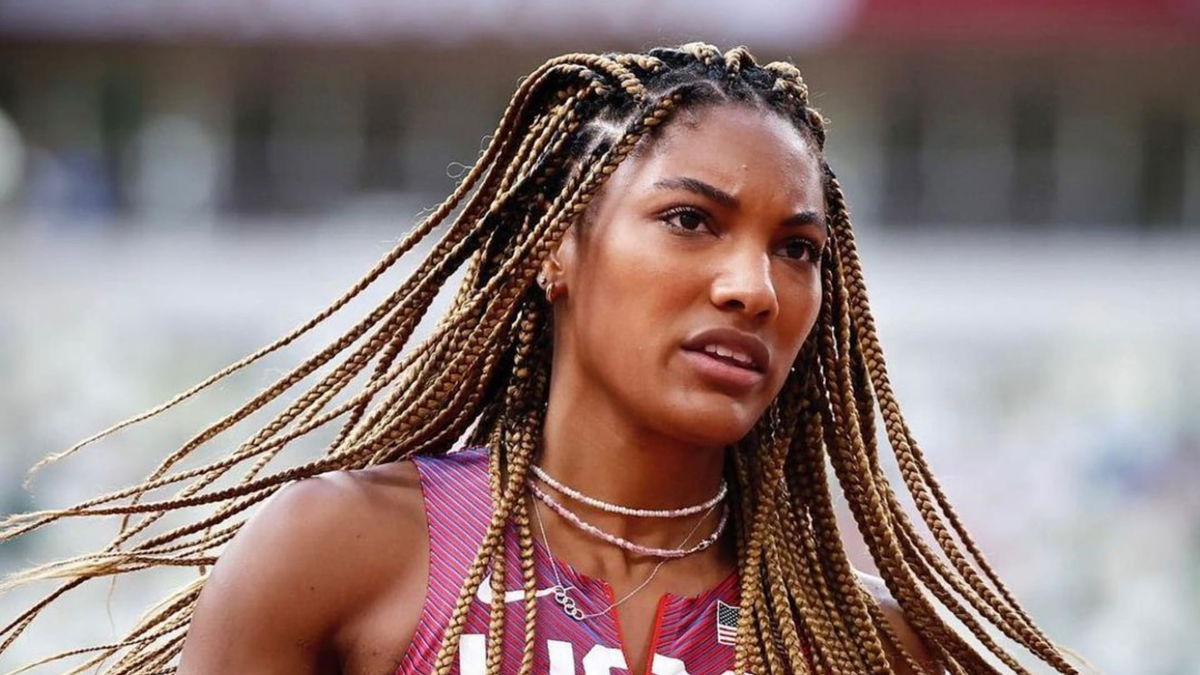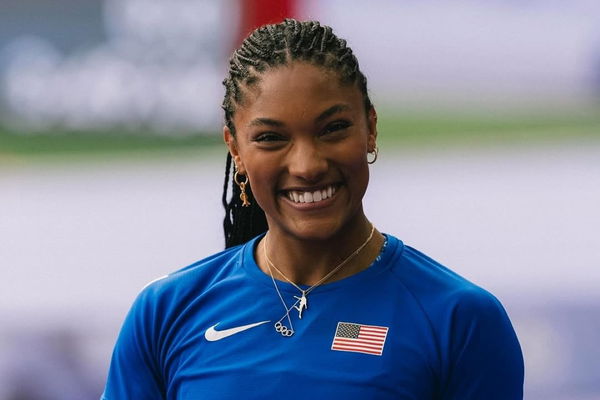

Before the medals, the spotlight, and the viral runway struts, Tara Davis-Woodhall was quietly fighting a mental battle behind the scenes. Long before Olympic glory, she was a standout at the University of Texas, but behind the scenes, things were crumbling. The pressure from coaches, expectations from family, the weight of competition, and the daily grind of being an elite athlete started chipping away at her. She began experiencing anxiety and depression, which eventually led to a panic attack. But then?
Watch What’s Trending Now!
That breaking point pushed her to try something she’d been hesitant about: therapy. It wasn’t easy at first, but over time, it became a game-changer. With the help of her therapist, Tara began learning how to manage stress, breathe through the chaos, and accept that not every day would be perfect. One piece of advice that stuck? Take things day by day and remember to breathe, which she shared with Cosmopolitan.
When asked, “Outside of Hunter being your support, you’ve always been vocal about your therapist and mental health journey. Are there any takeaways or mantras that your therapist has given you that you carry into competing?” That mindset would be put to the test in one of the most intense moments of her career: the U.S. Olympic Trials. On Tara Davis-Woodhall’s second long jump attempt, she scratched.
ADVERTISEMENT
In the past, that might have broken her. “I can definitely freak out and start crying and panicking, but if I do that, it’s done.” That’s when her therapist’s voice echoed in her head: “When you get stressed in a moment, I want you to breathe in what you want and exhale what you don’t want.” She took out her journal and scribbled the words, “Breathe in confidence, exhale fear.”

ADVERTISEMENT
With her nerves still on edge but her mindset realigned, Tara walked back onto the runway, repeated the mantra to herself, and took a deep, intentional breath. That jump wasn’t just technically perfect, it was mentally mastered. It launched her into the finals and eventually onto the Olympic team. That wasn’t just a leap in distance, it was a leap in self-belief.
ADVERTISEMENT
Since then, Tara Davis-Woodhall has been open about her mental health. Often, she explains that to keep her mind and body in balance, she writes, attends therapy, practises deep breathing, and realizes that perfection isn’t necessary. But being just 25, and understand this mental health therapy. It makes us wonder when she started facing it.
Therapy became a game-changer for Tara Davis-Woodhall
During her studies at the University of Texas, Tara Davis-Woodhall was depressed yet didn’t get help for it. After she experienced her first panic attack, she let the student mental health program know how appreciative she was of their support. She has depended on weekly sessions with her therapist for her recovery. Tara points out that reaching her daily goals can help keep her moving forward.
ADVERTISEMENT
And as she puts it, “I treat getting out of bed as an accomplishment because it helped me start moving again after being stuck for days or weeks.” These days, having therapy and being involved in mental health care is very helpful for Tara Davis-Woodhall. She explained that after a few months in therapy, she realized she had felt completely lost when things improved.
So Tara knew she didn’t need to change who she was. And her plans for 2025? Is here!!! To be kinder, more thoughtful, and as she shares, saying, “Actually, I do have some resolutions, but they’re not for track; they’re more personal. I just want to be a better human. I want to become more empathetic, care a little more, and not be so rough and blunt.” Tara’s journey reminds us all that mental health matters just as much as physical health.
Top Stories
Phil Mickelson Has the Last Laugh After PGA Tour Protege Rejected His LIV Golf Offer

‘Disturbing’ Fake Messages Force Amanda Balionis to Issue Urgent Warning

Scottie Scheffler Takes Side With Blunt 12-Word Message Days After Brooks Koepka’s Return Announcement

“Hard Being a Black Woman”: Coco Gauff on Donald Trump’s Administration

WATCH: Carlos Alcaraz Lashes Out at His Coach and Brother in Tense Win at the Australian Open

Fired Sean McDermott Doesn’t Hold Back in Final Message to Bills Mafia As Locker Room ‘Sickened’ by HC’s Removal

ADVERTISEMENT
ADVERTISEMENT
ADVERTISEMENT